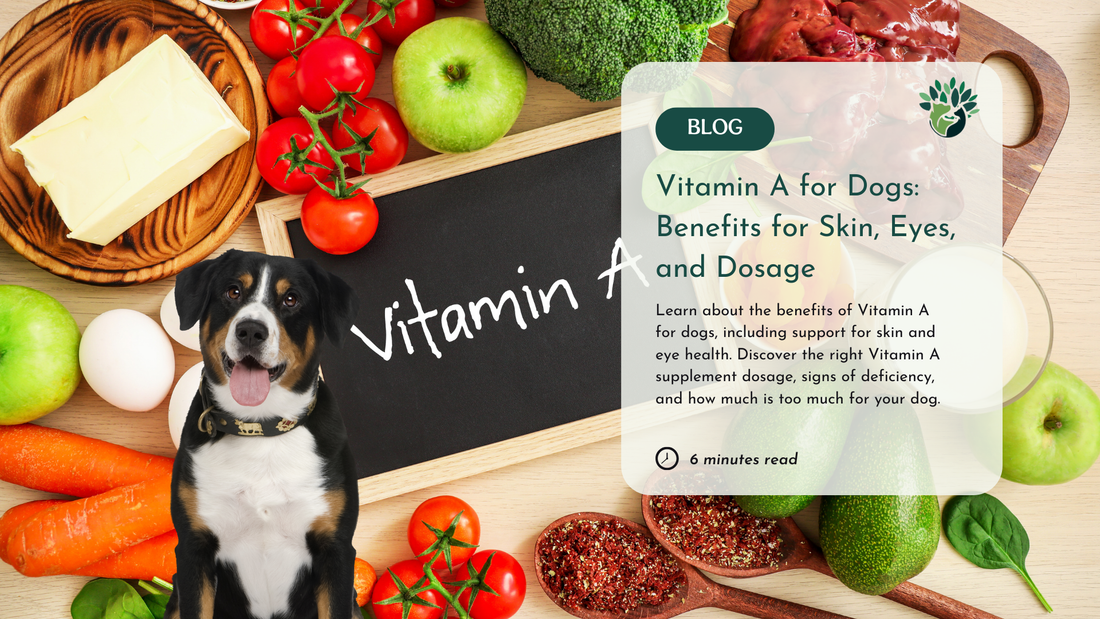Have you ever wondered if your dog might have a Vitamin A deficiency or if Vitamin A is beneficial for your dog's eyes and skin? Perhaps you’re curious about the right Vitamin A supplement for dogs. If that’s the case, I’ve got some helpful information for you, backed by recent research.
Why is Vitamin A Important for Dogs?
Vitamin A for dogs is an essential nutrient, meaning your dog must consume enough of it to stay healthy. It plays a critical role in supporting immune function, vision, and skin health. For instance, nursing mothers need adequate Vitamin A to pass on to their puppies through milk, ensuring their healthy growth.
Vitamin A for dogs' skin is crucial for maintaining a healthy coat and preventing skin conditions. It’s also essential for supporting muscle function and strengthening the immune system. Many pet owners started paying more attention to Vitamin A during the COVID-19 pandemic due to its immune-boosting properties. Additionally, Vitamin A for dogs' eyes is vital as it supports vision, particularly in low-light conditions, helping to prevent night blindness.
How Much Vitamin A Does Your Dog Need?
A good starting dosage is around 5,000 IU (International Units) per 10 to 20 pounds of body weight, especially if your dog has skin or eye issues. Recent studies have found that Vitamin A is safe for dogs even at much higher doses. For example, a collaborative study conducted by scientists from the Free University of Berlin, University of Potsdam, and WALTHAM Centre for Pet Nutrition evaluated the effects of Vitamin A on puppies. In this study, 49 puppies were given various Vitamin A doses ranging from 5,000 to 100,000 IU per 1,000 kcal of food energy. The results showed no adverse health effects at any dosage level, confirming that puppies can safely metabolize high levels of Vitamin A .
This research supports the idea that up to 100,000 IU of Vitamin A is safe for growing puppies, especially during their critical development phases . While some may worry about Vitamin A toxicity, these findings reinforce that dogs can handle much higher levels of Vitamin A than previously thought.
Vitamin A Deficiency Symptoms in Dogs
A Vitamin A deficiency in dogs can lead to issues in mucus-producing cells, which can affect the eyes and respiratory system. For example, Vitamin A for dogs' eyes is essential for preventing dry, itchy eyes and conditions like night blindness. Deficiency can also weaken the immune system, making your dog more susceptible to infections like pneumonia. Severe deficiency can affect growth and bone development, particularly in puppies, leading to hearing loss or developmental issues. Pregnant dogs lacking adequate Vitamin A may also experience fetal abnormalities.
Breeds Prone to Vitamin A Deficiency
While most balanced dog foods provide sufficient Vitamin A, some breeds are genetically predisposed to Vitamin A deficiency or may have absorption issues. Breeds that may need additional Vitamin A supplements for dogs include:
- Cocker Spaniels
- Labrador Retrievers
- Miniature Schnauzers
- Shar-Peis
Should You Give Your Dog a Vitamin A Supplement?
If your dog struggles to absorb Vitamin A from their food, supplementation might be beneficial. Vitamin A supplements for dogs can help improve skin health, support immune function, and boost vision. Puppies, in particular, benefit from additional Vitamin A for dogs' skin and bones to support healthy development. According to recent research, even higher levels of Vitamin A for dogs do not negatively impact growth or bone health, making it safe for use in growing puppies.
How Much Vitamin A is Safe for Dogs?
Vitamin A for dogs supports nearly every organ system, including their skeletal, reproductive, and immune systems. The recommended daily intake is about 3,333 IU per kilogram of dry food. However, research conducted by the European Pet Food Industry Federation (FEDIAF) confirms that dogs can safely consume up to 100,000 IU per 1,000 kcal without adverse effects.
While rare, too much Vitamin A for dogs can lead to toxicity, especially if they consume high levels from human skincare products containing retinol. Signs of Vitamin A overdose include:
- Seizures
- Lethargy
- Vomiting
- Joint stiffness
- Abnormal bone development
- Loss of appetite
- Paralysis
In extreme cases, an overdose can lead to cardiac arrest or death. If you suspect your dog has overdosed on Vitamin A, contact your veterinarian immediately.
Conclusion
The benefits of Vitamin A for dogs—from supporting skin and eye health to boosting the immune system—are significant. While toxicity is a concern at very high levels, recent research supports the safe use of Vitamin A supplements, especially during a puppy's growth phase. For dogs with genetic predispositions or malabsorption issues, a Vitamin A supplement for dogs may be a helpful addition to their diet.















